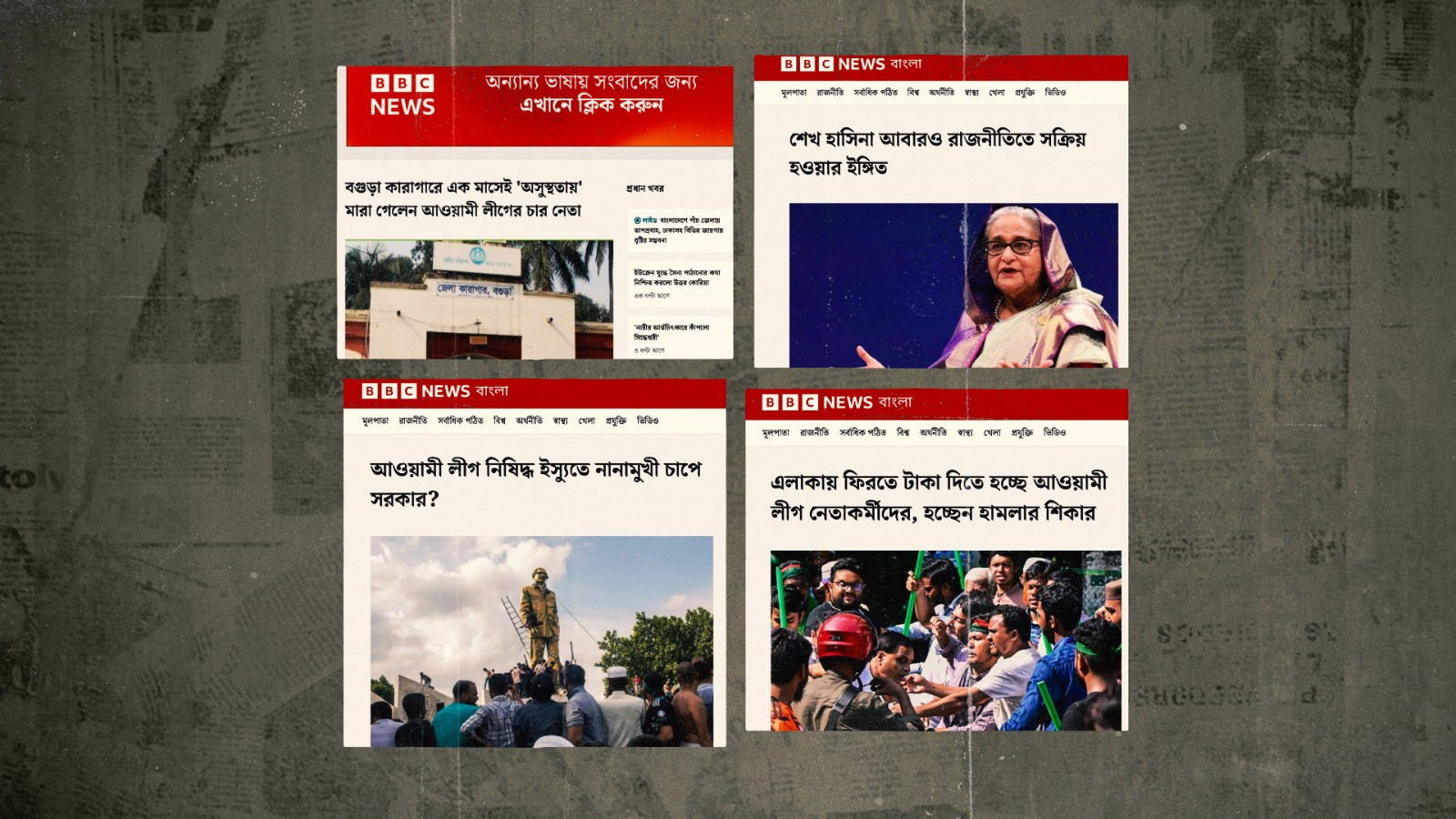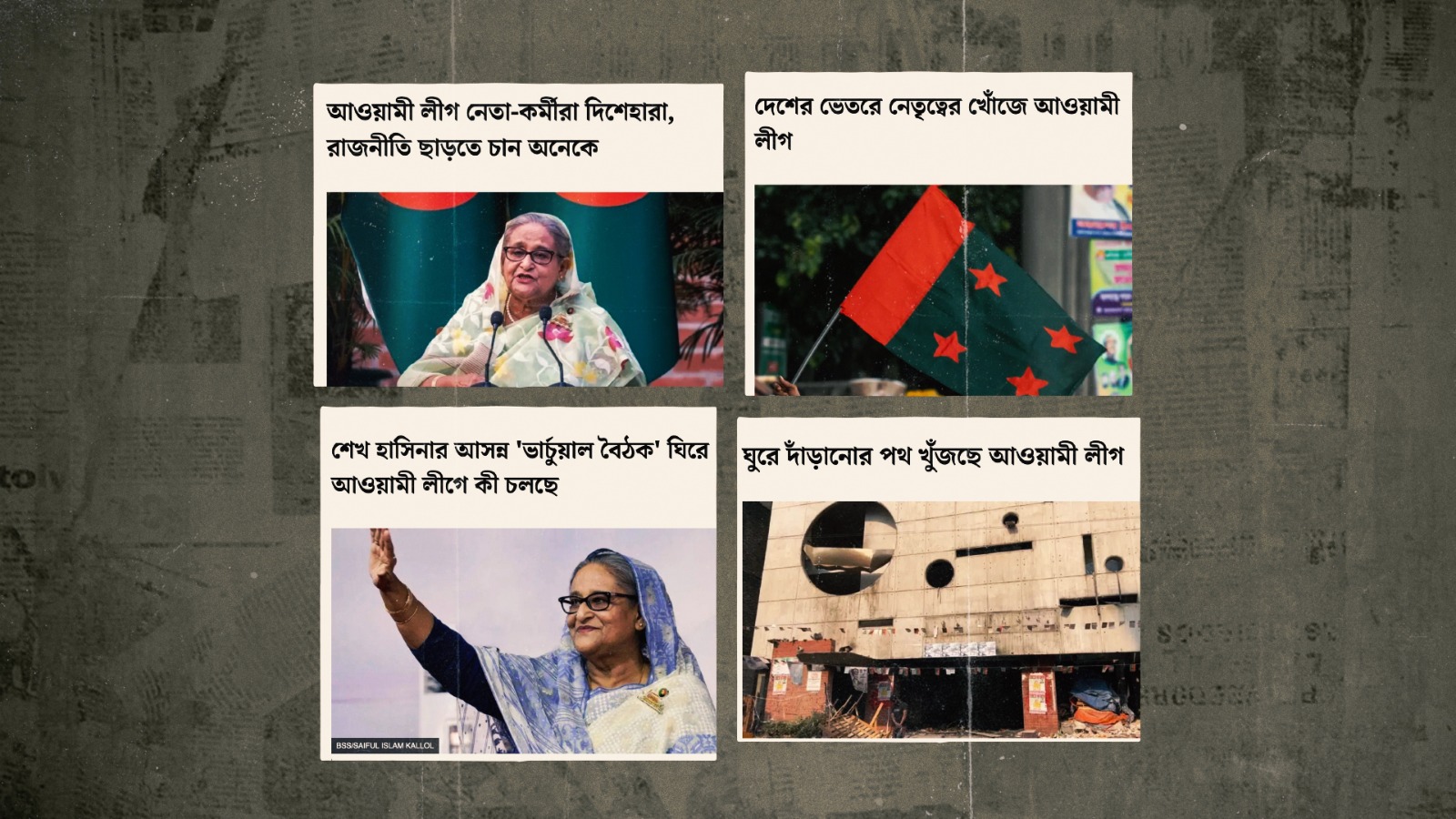Is BBC Bangla pushing a ‘specific view’ on the Awami League?

Since July 36th (or August 5th) no media outlet has chronicled the political future of the Awami League with the same frequency, tone, or selective empathy as BBC Bangla.
At first glance, the reports might seem like routine political coverage. But a deeper reading reveals a pattern worth interrogating.
Over the past few months, BBC Bangla has published at least one or two extensive stories each month that speculate on the Awami League's trajectory in a post-Hasina landscape.
These pieces, while framed from varying editorial angles, share several common themes that are impossible to ignore.
First, the relentless humanization of Awami League grassroots activists.
Story after story paints a picture of political foot soldiers–many of whom are currently sidelined, under scrutiny, or fugitives–living in “inhumane” or “difficult” conditions.
It’s a tried-and-true narrative technique: soft-focus profiles, often devoid of accountability, that invite sympathy for the individual without ever challenging the broader political machinery they were once part of.
Second, the deafening silence on Sheikh Hasina’s personal accountability.
Despite being at the helm for more than a decade, with increasing international scrutiny over democratic backsliding and authoritarian governance, Sheikh Hasina rarely features as anything more than a passing mention in these stories.
There’s little exploration of her responsibility in shaping the very system that now seems to be “weighing down” her party’s base.
Third, a remarkable leniency toward fugitive Awami League figures.
BBC Bangla has featured multiple quotes and anecdotes from absconding AL leaders–without a single mention of the serious charges they face.
This stands in stark contrast to coverage from the same outlet during the era of BNP and Jamaat rulings, where no story about Khaleda Zia or Tarique Rahman was published without a line-by-line rundown of their legal woes, often inserted even when irrelevant to the story.

Blissful ignorance
Then there’s the curious silence around the Awami League’s unofficial diaspora network in India which I call “The Kolkata blind spot.”
Some weeks ago, Prothom Alo published a detailed exposé on the comfortable lives of top AL leaders living in Kolkata–figures who continue to exert influence in Dhaka politics while operating from across the border.
Given BBC Bangla’s significantly larger operation in Kolkata–not to mention easier access to Indian-based political networks–this is a story they should have led.
They could have easily drawn on resources from their well-staffed Delhi bureau, or even collaborated across language services.
Yet, not a single mention of this issue has appeared in their reporting–not even a passing reference. The silence is not just glaring; it’s suspicious.
In the past week, BBC Bangla has also shifted its focus to a new theme: a “reformed” Awami League. This narrative, too, feels strangely out of touch.
Among Sheikh Hasina’s core supporters–the ones who actually hold the reins within the party–this concept has little resonance.
There is no grassroots movement demanding internal reform, nor any visible schism among the rank and file calling for structural change. If anything, the dominant sentiment is one of loyalty, not liberalization.
Yet BBC Bangla continues to insert this idea through rhetorical backdoors–editorial framing, selective interviews, and speculative commentary that imply a reformist momentum that doesn’t exist.
It’s definitely not an analysis; it’s aspiration masquerading as reportage.

Skewed coverage
This kind of editorial inconsistency is of course not without consequence.
By softening the public image of one political faction while holding others to harsher standards, BBC Bangla may be influencing the perception of Bangladesh’s political history–and future–in ways that are neither neutral nor transparent.
What’s even more striking than the tone of BBC Bangla’s coverage is who they choose to platform—and how.
Fugitive and criminally accused Awami League leaders, speaking freely from abroad, are routinely quoted in BBC Bangla reports as though their commentary carries no legal baggage.
Their words are published with a strange kind of reverence, as if these figures are simply seasoned political voices in exile, rather than individuals facing serious allegations at home.
Compare this to their treatment of BNP’s Tarique Rahman. During the period often referred to as Bangladesh’s “fascist era,” BBC Bangla was notably more cautious—even dismissive.
I don’t recall a single exclusive quote or interview with Tarique Rahman appearing in their coverage.
He was largely referenced through third-party allegations and legal summaries, rarely granted the platform to speak directly to his supporters or the public.
Of course, the editorial choices of any media outlet reflect broader currents: shifts in donor influence, regional politics, and internal newsroom dynamics.
But when one of the most prominent international Bengali-language services begins to sound more like a sympathetic chronicler of a ruling party’s twilight years than an impartial observer, it raises questions that deserve answers.
What explains this double standard? Who benefits from it? And most importantly: what does it say about the stories we aren't being told?
—
Adil Mahmood is a former journalist.

